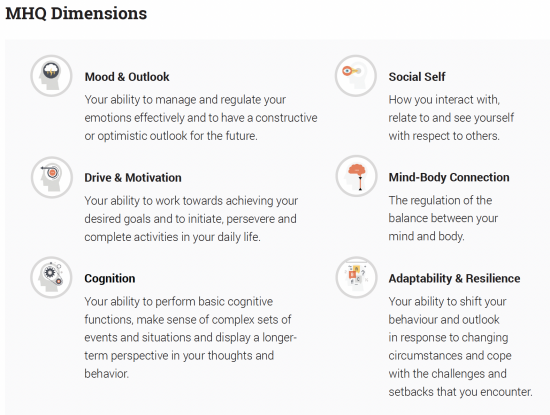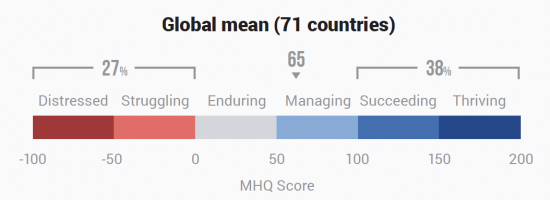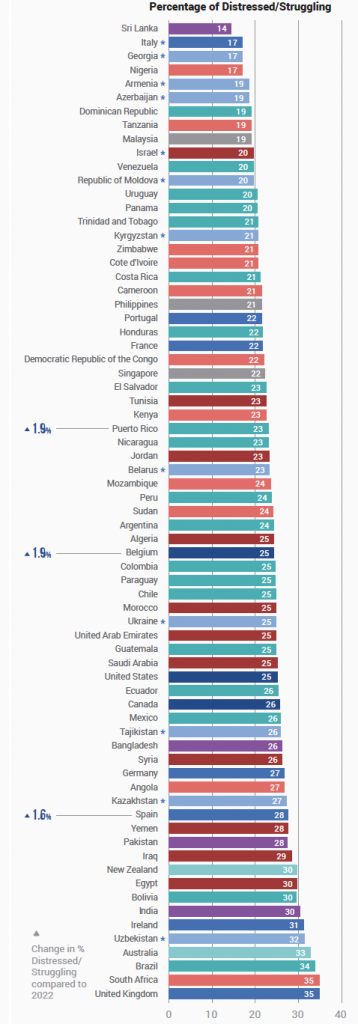George Monbiot had an article in the Guardian this week in which he drew attention to a report prepared by an organisation called the Global Mind Project. I have now looked at this report, published in March this year, and the data that they publish is as shocking as George suggests.
The survey that this project has undertaken since 2019 is based on interviews with 500,000 people in 70 countries, with that number expanding over time. The criteria for mental health well-being that they are seeking to appraise is based on the following categorisations of wellbeing (MHQ means mental health quotient):

I am aware that everything in this area is subjective, and there is always risk in undertaking surveys of this sort, from sample selection, to question formulation, to inherent prior biases, to interpretation. But, on issues such as this, there is no way around these problems: these problems come with any attempt to collect data on well-being. Having had more experience during my lifetime than I would ever have wished for of people I know suffering from ill health, to organise a survey using these criteria appears appropriate to me. That is the best that I can say.
Having noted this caveat, and noted that they have used consistent approaches, the results are shocking.
Overall, average, mental health within the survey population is reported on this scale:

Reporting this data on a country basis produces this outcome:

A * represents a country not in all surveys since the work began.
Note that the UK is second from the bottom. The survey is not complete with regard to all countries in the world, but it is very likely that as a country we suffer from higher levels of mental ill health than is commonplace, even amongst comparable nations.
We actually do worse when it comes to the ranking of those in most distress, where UK comes bottom:

As another table suggests, we do particularly badly with regard to mood and outlook, the social self and mind-body connection.
I hardly need telling that life in the UK is pretty grim. I have noted our descent into chaos and despair on this blog since 2010 when I think our serious decline commenced. I have always been unapologetic for doing so, and for criticising those who are responsible. I did not, however, expect things to be anything like this bad chart. This data suggests that the UK is a complete outlier when it comes to mental ill health.
George Monbiot quite rightly suggest that this is because the cult of neoliberalism has been so powerful in the UK and has not been seen to the same extent anywhere else. I am not disputing that, but I think it requires further comment.
The most graphic representation of this might be seen in the rise of Kier Starmer's Labour Party, where the idea that the government might have responsibility for anything, or a duty to act, has been abandoned in favour of a market-based ideology that seeks to maximise national income without any apparent concern for its distribution, and then emphasises constraint on the scale of government rather than the meeting of need. These false ideologies are what lead directly to the above data.
Most particularly, the sense of despair that so many will feel within the UK is a direct consequence of the inability of many to adapt to crises that undermine their resilience. In far too many organisations, and even in healthcare, the response to this is to suggest that people be taught how to be more resilient. That, however, ignores the fundamental problem. That problem is that if you have a government that has deliberately stacked the odds against you, and has denied you the opportunity to partake in the wealth and well-being of society so that you cannot adapt to the stress it has imposed upon you by the relative misfortune that you have suffered then no amount of resilience training will overcome the structural problems you face as a consequence.
The UK is a wealthy country. The Office for National Statistics suggests that we have personal private wealth in the UK exceeding £15 trillion. However, the ownership of that wealth is massively skewed in favour of a very small part of society. Most people have little or no savings with which they can deal with crises. The state offers them almost no support when it is required. Access to credit is also limited, or incredibly expensive. And the state benefit system too often penalises people if at any time they cannot meet its demands precisely because their well-being is at risk.
If an incoming Labour government was serious about meeting the needs of the people of this country, then this data suggests that if it is to meet the needs of people in this country, it must do at least six things.
The first is that it needs to significantly increase the value of benefits in the UK. They are shockingly low.
The second is that it needs to end almost all of the sanctions that the benefits system imposes upon people, usually for trivial offences that fail to respect the realities of confused and profoundly stressed lives.
Third, the protection of people in the workplace is absolutely vital so that they do not suffer the stress that current labour laws impose upon them. It looks as Labour is giving up on this pledge.
Fourth, they need to provide a state bank that can deliver support for people in crisis, with the right to recover sums owing to them out of benefits, if necessary, thereby reducing the risk premium charged on loans to those with low income. There is no reason why this could not be done.
Fifth, there needs to be a massive redistribution of income and wealth in the UK, as suggested in the Taxing Wealth Report.
And sixth, ethical judgement and not spreadsheets need to be the primary tool for politicians, once more.
What chance is there that Labour will do any of these things? Next to zero, I suggest. The misery will continue.
Thanks for reading this post.
You can share this post on social media of your choice by clicking these icons:
You can subscribe to this blog's daily email here.
And if you would like to support this blog you can, here:



Any decent politician would seek power in conjunction with morals. History teaches the appalling consequences for society if it allows politicians who put power before morals to command the levers of government. This week we’ve seen Keir Starmer put power before morals yet again. I think Keir Starmer and his supporters are mentally ill.
That was a distressing read.
But it needed to be said.
What I always struggle with our politicians and corporations is how they mostly appear to be devoid of empathy or any humanity for others less fortunate.
It was always the plan to return to the UK from France where I live for retirement.
However I keep holding off hoping things will improve.
I am not hopeful.
Richard,
I don’t disagree with you.
May I suggest expressing it a different way?
My view is that what we need is best expressed as a nation that provides for everyone to be able to maintain themselves and their families, this can be through work, benefits and ‘Universal Services’
I suggest, and I dont think that I am alone in this that it would reduce a lot of our economic and social problems.
It was interesting to see a call by a retiring Chief Constable of Merseyside for much the same thing
https://www.standard.co.uk/news/uk/merseyside-police-guardian-b930357.html
Former Conservative MP Jerry Hayes said much the same on his website – sadly it now seems to have gone
And yes, we need a massive culturfe change in the DWP or whatever replaces it
Universal services are really important – and much more affordable than UBI
Thanks for that interpretation and synopsis. Very timely.
Dreadful that Britain has been dragged down to the bottom of the table of happiness, by the obvious idiocy of neoliberal economics, and greed.
I did the MHQ quiz and it took me more than twice the 15 minutes suggested time.
I scored 95.02 on a scale from -100 to +200, so nearly half way up the positive side; it says “Managing – could do better”.
Highly subjective test – can’t be anything else. So dependant on the honesty, cockiness/modesty, conceitedness etc..
I am throughly depressed and despondent about the state of the country and its people – that is so far removed from real clinical depression, though it just might become a factor, I suppose.
Do you have a link for that test?
Link to MHQ test.
https://sapienlabs.org/mhq/
Thank you